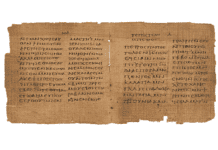Meanwhile, the Archbishop of Russian Orthodox churches in Western Europe has publicly implored Kirill to raise his voice with Russian authorities against the “monstrous and senseless war.” He also rejected the characterization of the conflict as a “metaphysical” battle.
“With all the respect that is due to you, and from which I do not depart, but also with infinite pain, I must bring to your attention that I cannot subscribe to such a reading of the Gospel,” read the archbishop’s letter.
And at least one Russian Orthodox Church in Amsterdam has made moves to leave the church because of Kirill’s stance on Ukraine, hoping to affiliate with Ecumenical Patriarchate Bartholomew. This despite an intimidating visit from a Russian archbishop: The cleric, who arrived in a car from the Russian embassy, told priests that the Moscow Patriarchate and the Russian Foreign Ministry were keeping an eye on their church.
“We cannot go back on our decision to distance ourselves from Patriarch Kirill,” read a statement from the church’s priests. “Our consciences will not allow that.”
It remains to be seen whether these and other efforts will push Kirill to deviate from years of operating in lockstep with Putin. The Russian president’s drive to continue the war remains strong, as does his embrace of religious rhetoric: at a rally on Friday, Putin praised Russia’s troops in a way that echoed Kirill and paraphrased the Bible, saying, “There is no greater love than giving up one’s soul for one’s friends.”
But religious pressure on Kirill doesn’t appear to be letting up either. When Pope Francis held a meeting with Kirill this week to discuss the conflict, he made a point to warn against trying to justify armed invasion, expansion or empire with a Christian cross — something the Catholic Church knows something about.
“Once upon a time there was also talk in our churches of holy war or just war,” Francis told Kirill, according to the Vatican press office. “Today we cannot speak like this.”
This article originally appeared here.











